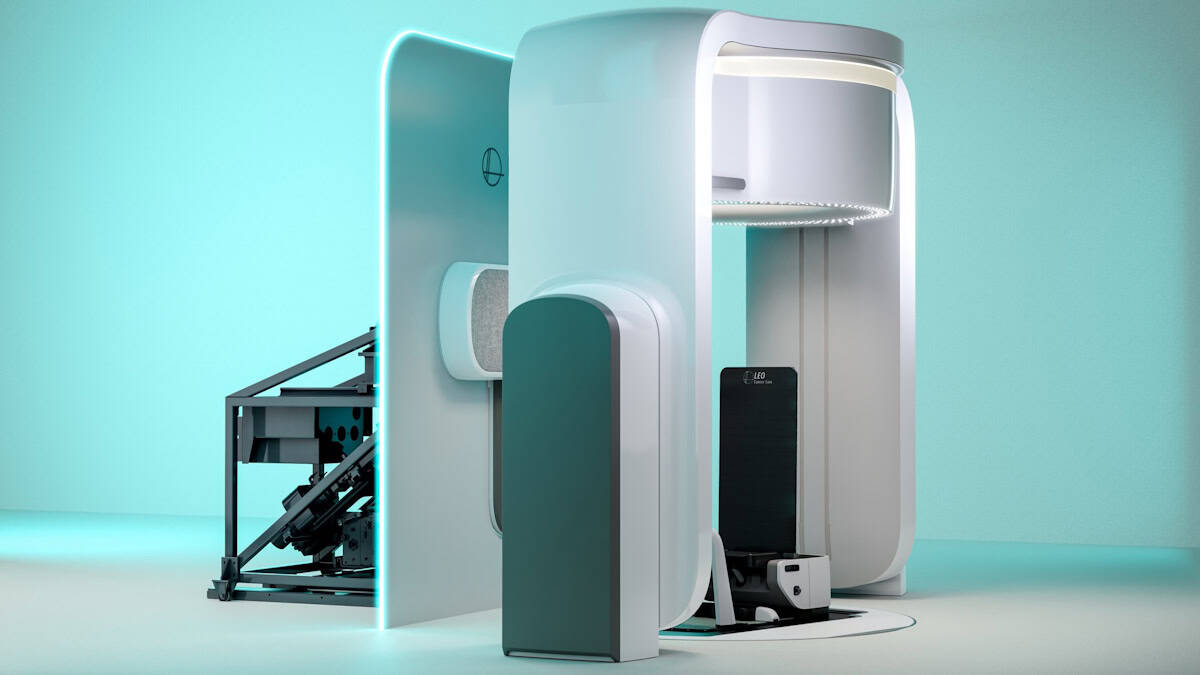Science
Leo Cancer Care Unveils Revolutionary Upright Photon Therapy System

Leo Cancer Care has launched its first upright photon therapy system, named Grace, at the ASTRO 2025 meeting in San Francisco. This innovative development represents a significant shift in radiation therapy by allowing patients to receive treatment in an upright position, enhancing both comfort and effectiveness.
The upright radiotherapy system operates by rotating the patient in front of a fixed treatment beam, a departure from traditional methods where patients lie flat during treatment. Clinical studies suggest that this position may lead to more consistent anatomical positioning and organ stability. Patients who have experienced the technology have reported improved comfort and a stronger connection with their therapists.
The design of Grace has practical benefits as well. A fixed treatment beam simplifies the overall system design, which can reduce space and shielding requirements, ultimately lowering infrastructure costs. For proton therapy, this approach eliminates the need for a bulky gantry, increasing accessibility to advanced cancer treatments worldwide.
In collaboration with Mevion Medical Systems, Leo Cancer Care developed the MEVION S250-FIT, an ultracompact upright proton therapy system that can fit inside a linear accelerator vault. The company’s latest focus on conventional X-ray radiation therapy marks a return to its original mission of providing cost-effective treatment options without compromising quality.
Innovative Design and Patient-Centric Approach
The Grace system features an upright positioning apparatus that offers six degrees of freedom and continuous 360-degree rotation, paired with a stationary 6 MV photon linear accelerator. According to Sophie Towe, the company’s director of marketing, “Our future innovation, Grace, will take a proven technology, photon therapy, and rethink the way it can be delivered. Upright treatment isn’t just about comfort; it’s about consistency, stability, and ultimately accessibility.”
The system is equipped with a fan-beam CT scanner located at the treatment isocenter, which facilitates planning-quality imaging throughout the treatment workflow. It also includes a large, ultrafast multileaf collimator that, alongside the stationary photon beam delivery, optimizes dose conformity and enhances treatment efficiency.
In a statement, Stephen Towe, co-founder and CEO of Leo Cancer Care, emphasized the company’s commitment to innovation: “Grace represents a return to our original company focus of delivering more cost-effective photon treatments to a global stage without sacrificing treatment quality.”
Future Installations and Collaborations
The first pre-commercial Grace systems will be installed in healthcare institutions participating in the Upright Photon Alliance research collaboration. This group includes notable organizations such as Centre Léon Bérard, Cone Health, IHH Healthcare, Mayo Clinic, and OncoRay.
Leo Cancer Care aims to redefine radiotherapy delivery, putting the patient’s needs at the forefront of treatment. With the introduction of Grace, the company is not only innovating but also striving to make advanced cancer care more accessible to patients globally. As the healthcare landscape evolves, the potential for upright photon therapy could reshape how radiotherapy is delivered, making it a more adaptable and human-centered approach.
-

 Entertainment3 months ago
Entertainment3 months agoAnn Ming Reflects on ITV’s ‘I Fought the Law’ Drama
-

 Entertainment4 months ago
Entertainment4 months agoKate Garraway Sells £2 Million Home Amid Financial Struggles
-

 Health3 months ago
Health3 months agoKatie Price Faces New Health Concerns After Cancer Symptoms Resurface
-

 Entertainment3 weeks ago
Entertainment3 weeks agoCoronation Street Fans React as Todd Faces Heartbreaking Choice
-

 Entertainment3 months ago
Entertainment3 months agoCoronation Street’s Carl Webster Faces Trouble with New Affairs
-

 Entertainment3 months ago
Entertainment3 months agoWhere is Tinder Swindler Simon Leviev? Latest Updates Revealed
-

 World3 weeks ago
World3 weeks agoBailey Announces Heartbreaking Split from Rebecca After Reunion
-

 Entertainment4 months ago
Entertainment4 months agoMarkiplier Addresses AI Controversy During Livestream Response
-

 Science2 months ago
Science2 months agoBrian Cox Addresses Claims of Alien Probe in 3I/ATLAS Discovery
-

 Health5 months ago
Health5 months agoCarol Vorderman Reflects on Health Scare and Family Support
-

 Entertainment4 months ago
Entertainment4 months agoKim Cattrall Posts Cryptic Message After HBO’s Sequel Cancellation
-

 Entertainment3 months ago
Entertainment3 months agoOlivia Attwood Opens Up About Fallout with Former Best Friend

















